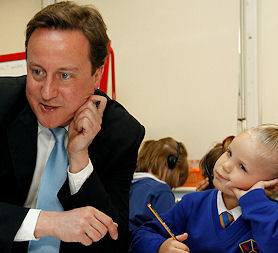Child poverty: ‘Support better than benefits’
A study into child poverty by Labour MP Frank Field says disadvantaged families should be offered more support rather than benefit increases and tax credits.

Mr Field, Welfare Reform Minister in Tony Blair’s first administration, was asked to carry out a study of poverty in Britain by Prime Minister David Cameron, when the Coalition took office. Mr Cameron today welcomed the report.
Mr Field says some poorer five-year-old children are starting their first day at school at a huge disadvantage compared with children from better-off backgrounds, condemning many of them to a life in poverty.
“We have found overwhelming evidence that children’s life chances are most heavily predicated on their development in the first five years of
life,” he says.
“It is family background, parental education, good parenting and the opportunities for learning and development in those crucial years that
together matter more to children than money, in determining whether their potential is realised in adult life.”
“Poverty target has not been met.” Frank Field
Mr Field says that despite progress in lifting 600,000 children out of poverty, the previous Labour Government’s pledge to halve child poverty by 2010-11 has “not been met”.
Alternative strategy needed
Labour spent heavily on tax credits to combat poverty, he says, but “there is a clear case to be made for developing an alternative strategy” of supporting families with children under five.
“No longer should governments automatically increase benefits for children (above inflation increases), but on each occasion consider
whether the life chances of poorer children will be increased more by transferring any benefit increases into building the Foundation Years.”
Life Chances Indicators
Mr Field calls for the creation of a set of Life Chances Indicators to measure children’s cognitive, physical and emotional development at the ages of of three and five.
He wants reform of the education system, with a new focus on the early years. Parents should be offered midwifery and maternity advice, a home visiting service and a wide network of voluntary support.
The Child Poverty Action Group welcomed some of Mr Field’s ideas, but said the Government should not narrow its focus in its aim to eradicate child poverty.
The CPAG’s head of policy, Imran Hussain, said it was important Ministers retained “broad strategy across income, disability, fair pay, childcare, housing and basic living costs”.
The TUC general secretary, Brendan Barber, said: “The report understates the importance of families’ incomes.
“The biggest problem faced by poor is still that they haven’t got enough money.” TUC General Secretary Brendan Barber
“The biggest problem faced by poor people is still that they haven’t got enough money and face debts that put intolerable strains on their finances,” he said.
Vital moment
But in a joint letter to Mr Field, Mr Cameron and the Deputy Prime Minister Nick Clegg said his report marked “a vital moment in the history of our efforts to tackle poverty and disadvantage”.
They added: “Poor children are at a high risk of becoming poor adults. This violates any notion of fairness. Nobody should be condemned to poverty or constricted life chances because of the circumstances of their birth.
“That is why the Coalition Government has already made the promotion of inter-generational mobility the principal goal of our social policy.”